Best E-commerce Platforms, We know e-commerce platforms offer great functionality for businesses. With the best e-commerce platforms, a business owner can manage their website, marketing, sales, and operations all in one place a one-stop solution.
Before you think of just investing in any platform, it is essential to know which platform works best for your business–allowing you to make the most of the features offered by the said platform. Recognizing that there is a wide selection of e-commerce platforms available in the market, we’ve made your shopping process easier.
Below we’ve compiled our top picks for the best e-commerce platforms for business owners this year to help you find the ultimate choice.
Best E-commerce Platforms – Quick Look
| Companies Name | Customer Support | Pricing |
|---|---|---|
| Shopify | 24x7 chat, phone & email on all plans | |
| Magento | No Support since its Open source | |
| BigCommerce | 24x7 chat, phone & email on all plans | |
| Squarespace | 24x7 email, limited live chat | |
| PinnacleCart | Limited Email, live chat, & email | |
| PrestaShop | Free resources, paid human support. | |
| Volusion | 24x7 phone, live chat support. | |
| Shopware AG | Paid Customer support | |
| Infusionsoft | Help centres & Resources | |
| X-Cart | Paid customer support | |
| Miva | 24x7 phone, email, web tickets. | |
| CS-Cart | Limited support credits followed by purchasing credits. | |
| Beeketing | Email, Facebook chat, & ticket support. | |
| 3Dcart | Email, live chat for starter plan, phone support for higher plans. | |
| Site123 | Live chat, & Email support | |
| Sharetribe | Forum and Communities. | |
| NopCommerce | Personal support at premium plan | |
| Sumo | Community forum |
Shopify
Shopify is a web-based e-commerce platform designed to allow anyone to set up an online store to sell products. Launched in Canada in 2006. Shopify allows different merchants to use it whether you sell online, on social media, in-store, or from the trunk of your car.

Managing inventory, optimizing conversions, and navigating logistics are among the key challenges for eCommerce Bussiness
Services
As mentioned, the Shopify platform allows its users to sell a wide selection of products. These products are grouped into 5 different categories. Which include physical products such as clothing, jewelry, and even dried food, digital products such as eBooks, design templates, and courses, and ticketed experiences such as wine-tasting events and platforms, classes, and lessons and rentals.
At the moment, the platform holds the record for the largest e-commerce platform–with up to 800,000 registered online stores supported by 3000 in-house employees. Combined these businesses, mass up to $63 billion worth of sales per year.
Pricing
Shopify comes with a choice of three price bands depending on your preferences. You can opt for the Basic Shopify, Shopify, and Advanced Shopify plans. These price bands are priced in a monthly or yearly based subscription. The basic subscription is $29/month and caters to small businesses that are just starting up.
With the Basic plan, one enjoys unlimited product sales, up to 2 employee accounts, and 4 inventory locations. They charge the business owner a 2% transaction fee if they don’t use Shopify payment. The Shopify plan is $79/month and caters to growing businesses, allowing up to 5 staff accounts and 5 inventory locations.
This plan unlocks more features such as gift cards and abandoned cart recovery whilst offering a transaction fee of only 1% if you don’t use Shopify payments. The advanced Shopify plan costs $266 per month and offers superior advanced features to help you scale up your business.
With this plan, business owners enjoy features such as advanced reporting and automatic shipping rate calculations. The plan offers the lowest transaction fees of only 0.5% if you don’t use Shopify payments.
Besides the standard monthly subscriptions, Shopify lets business tailor their own needs whilst also providing additional plans. For example, you can find a lite plan for selling on social media for only $9 a month or an enterprise plus plan which costs up to $2000 per month and caters to larger online stores.
Each plan offers the Shopify POS feature – allowing you to sell in person too. You can even upgrade this feature at an extra cost to enjoy more advanced functions.
Customer Support
Shopify customer support is quite reliable, offering 24/7 phone support to all its customers, no matter their payment plan. You can access customer support via social media platforms, email, or 24/7 live chat support. Their help center on the official site shares detailed information about common issues. If you want to begin there before seeking an actual person for help.
Payments and Shipping
Shopify supports a wide range of payment options including credit cards, PayPal, manual payment options, and even BitPay for Bitcoins. People can also opt for the platform’s own payment gateway, which waives transaction fees.
To protect one’s financial information, payment transactions, and customer data are encrypted using SSL at no extra cost. They handle shipping via email whilst the rates as set according to the country or shipping carriers. Alternatively, you can also opt for fulfillment and dropshipping services.
Ease of Use and Design
What makes Shopify popular is that it works great even for the non-tech savvy. Everything is done with just a simple click on the platform’s user-friendly interface. They pack the platform with a choice of modern-looking and ultra-responsive templates to choose from.
If want to get creative, you can even build your templates from scratch. Its SEO features meet the minimum requirements for online stores however, you may find that URLs will add terms such as “/products”.
The interface offers all the key functions you would expect from an e-commerce platform. These include zooming functions, photo, and video galleries, defining options such as size and color, and page activities such as abandoned cart recovery.
Pros
- Charges transactional fees if you don’t use the Shopify gateway payment services.
- Quick speed and loading time.
- Secure platform with free SSL encryption during checkout.
- Very easy-to-navigate interface.
Cons
- Customer support response is slow with an average response time of 30 minutes.
Magento
Magento is an open-source e-commerce that allows online sellers to use a flexible shopping cart system for their customers whilst also managing the content and functionality of their online store. Packed with a host of features, Magento works great for both small sellers and larger e-commerce sites.
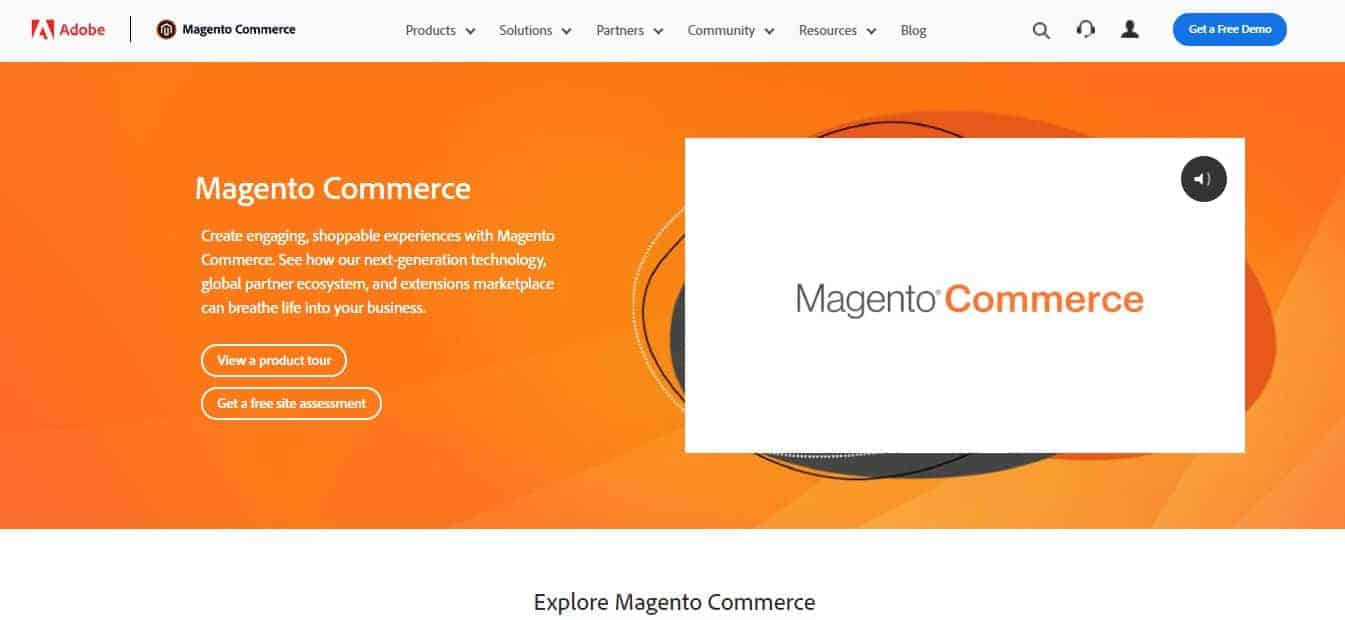
It works best for developers because of its somewhat complex features and interface.
In fact, as of 2018, Magento accounted for 30% of the total market share. Whilst a small private company, Varien inc developed it., it is now owned by Adobe.
Services
The platform allows merchants to sell a wide range of goods and services. However, what really makes Magento stand out is the list of products it offers and the features available.
Besides the e-commerce store services offered, Magento offers other products curated to boost your business performance and analytics. These include Business Intelligence and Adobe Commerce Cloud.
Besides the products, the key features, your business will benefit from include page builder, order management, progressive web app, product recommendations, and Amazon sales channels.
To really make the most of the platform, it offers an array of integrations with accounting, dropshipping, email marketing, and customer service apps such as QuickBooks, AliExpress, and MailChimp, just to mention a few.
Pricing
With pricing, Magento doesn’t offer conventional pricing plans like other regular platforms. Instead, you can enjoy it in two key ways. If you opt for the Magento Open source edition, the service is free. This option works great for developers or small business owners.
However, if you think that option for this option will protect you from any expenses, you will lie to yourself. Besides access to this platform, you still have to think about additional costs such as web development, hosting, and other auxiliary services. If you opt for the Magento e-commerce option, you still won’t have a clear pricing plan.
Request a breakdown. Typically, the charges range anywhere from $2000 to $10,000 per year. Again, besides the Magento fees, you want to think of other expenses in case you want extra services such as hosting, maintenance support, designing, and even third-party integrations.
Customer Support
When using Magento, customer support is not as reliable as there’s no live chat, email, or phone support. You are only limited to the resources on the website. Some key resources include the user guide, articles, community forums, blogs, developer documents, resource library, and sale portal. And Magento U.
Payments and Shipping
Magento accepts purchase orders, checks, and money orders. However, a business owner must first integrate with a payment gateway to accept card payments from their customers. You will find an option of 300+ payment gateway options to choose from, with pricing ranging from free to around $600.
Ease of Use and Design
In terms of the user interface, Magento is not as easy to navigate, and setup is difficult. Therefore, it may be a good idea to hire someone who has more expertise if you are not tech-savvy. If you have the time to spare, however, the platform offers a demo account, you can sign up to form your website to give you a crash course on how to navigate it.
Pros
- Offers a free demo account to familiarize yourself with all the processes.
- Perfect for a business that wants to scale up.
- There’s a free edition for small business owners and developers.
- Compatible with different devices and screen sizes.
Cons
- The user interface is not friendly for non-tech-savvies.
BigCommerce
BigCommerce is a public technology platform for SaaS e-commerce. Whilst it boasts a different profile of merchants and businesses, it’s built for medium-sized and enterprise businesses of about 10 to 50 employees and with a revenue of at least $50,000 to $10 million per year.
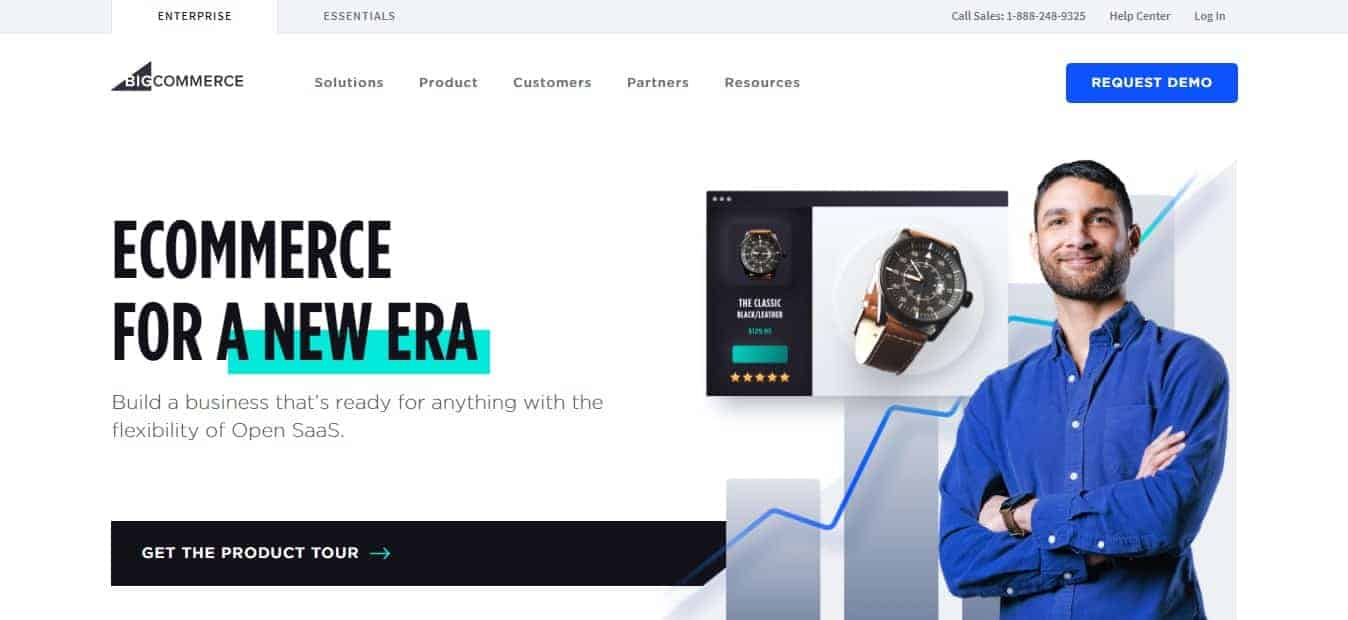
Services
Founded in 2009, BigCommerce has been seeing a rise in revenue at up to $112 billion per year. Employing up to 600 staff, the platform caters to 60,000+ businesses and has since gone public with an IPO. Amongst the key features, the platform offers to include web hosting, SEO, customer groups, and segmentation, to mention a few.
Besides its own features, BigCommerce offers a wide range of integrations compared to many other platforms. With up to 750 native plugins, they ensure you find any resources you need, be it accounting or email marketing features.
Pricing
If you want to proceed, you can choose from the available pricing plans. Each plan is charged monthly with no contract.
However, if you choose to pay annually, you will enjoy a 10% discount. The platform offers 4 key plans: Standard, Plus, Pro, and Enterprise.
The Standard plan costs around $29.95 per month and offers sales of up to $50,00 per year with unlimited storage, staff accounts, and bandwidth. The Plus plan costs $79.95 per month and covers the standard plan benefits along with sales of up to $180K per year, abandoned cart saved, customer groups and segmentation, stored credit cards, and persistent cart.
The Pro plan costs $299.95 per month it covers all the Plus benefits along with sales of up to $400k per year, price increases every month, Google customer reviews, faceted search, and custom SSL. The Enterprise plan caters to bigger needs. Thus, the pricing depends on your tailored needs.
Customer Support
Customer support is excellent when using BigCommerce. The e-commerce platform offers 24/7 personal support via live chat, contact form, email, and phone no matter the plan. You can find great resources on the website too these include the help center, community forums, guides, and videos.
Payments and Shipping
BigCommerce integrates with over 65 payment gateways and 250 local payment methods such as PayPal and 2 Checkout. As a business owner, you will also enjoy its zero card transaction fee arrangement. The platform has partnered with PayPal through Braintree significantly cutting down the processing fees.
Ease of Use and Design
For user-friendliness, this platform is perfect for any user. You can compare BigCommerce’s ease of use with that of WordPress. In fact, they rank BigCommerce amongst the easiest e-commerce platforms to navigate. Plus, the 15-day free trial offers a perfect chance to test out its smooth and user-friendly interface.
Pros
- It has no transactional fees.
- The extremely user-friendly interface is even for beginners and non-tech savvies.
- Reliable and all-around customer support.
- It integrates with a wide range of very good and popular apps.
Cons
- It doesn’t have the best features for larger businesses.
Squarespace
Squarespace offers an all-in-one solution for individuals looking to build a fully equipped website, The platform offers domains, e-commerce features, shooting, and galleries for designs. Individuals or small businesses, especially those looking for simple designs and essential web services at affordable pricing.

Services
Squarespace launched in the USA in 2004 and for nearly 2 decades, it has grown both its employee number, customer pool, and revenue. Employing over 1000 staff, the platform supports 50,000+ customers and draws in a revenue of over 75 million per year.
Besides being a one-stop solution for web design and hosting, Squarespace comes with a wide option of integrations. Amongst them include Amazon, MailChimp, G Suites, Instagram, Apple Pay, and Xero Accounting, just to mention a few.
Pricing
You can find original plans available for monthly or yearly payments (annual payment offers an extra 10% discount).
The lowest Personal plan costs $16 per month and works best for personal use offering to 20 pages. For a small business, you can opt for the Business plan for $26 per month or the Basic Commerce plan for $30 per month. An advanced commerce plan on the other end costs $46 per month and offers unlimited bandwidth. The cost also includes web hosting and free domain registration (if you pay annually) you can use your domain if you have an existing one.
Customer Support
Squarespace offers 24/7 customer support you can opt for email support or live chat support (available during weekdays from 4 am to 8 pm ET). However, the platform doesn’t offer phone support., Besides the one-on-one support, you can opt for extra resources available on the website such as the community forum or knowledge base.
Payments and Shipping
Squarespace supports card payments and other payment gateways. You can easily circumvent transaction fees for the Basic Commerce and Advanced Commerce plans. However, for the business plan, you will pay up to 3% of your total transactions.
Ease of Use and Design
Squarespace is designed for personal use and small businesses thus, it comes as no surprise that it features a user-friendly interface. After all, the intended target group normally has a limited budget so, in most cases, they wouldn’t have extra cash to hire a professional. Over the years, the platform has replaced its complicated coded backend with an easier drag-and-drop editor.
Whilst Squarespace offers a generous selection of designs and templates to build your website, it still limits design customization. So, if you need something extra and special, you may have to hire a professional to improve the templates.
Pros
- It doesn’t offer design customization.
- Replaced older coding backend to the drag-and-drop editor for ease of use.
- Mobile, tablet, and PC-friendly interactive and responsive designs.
- Zero transaction fees for the Commerce plans.
Cons
- It doesn’t offer a multi-currency selling functionality.
PinnacleCart
PinnacleCart is an e-commerce platform designed for entrepreneurs. They design the platform to offer all the essential tools for an e-commerce site in one place. You can add products, sell them, market them, and even customize your website.
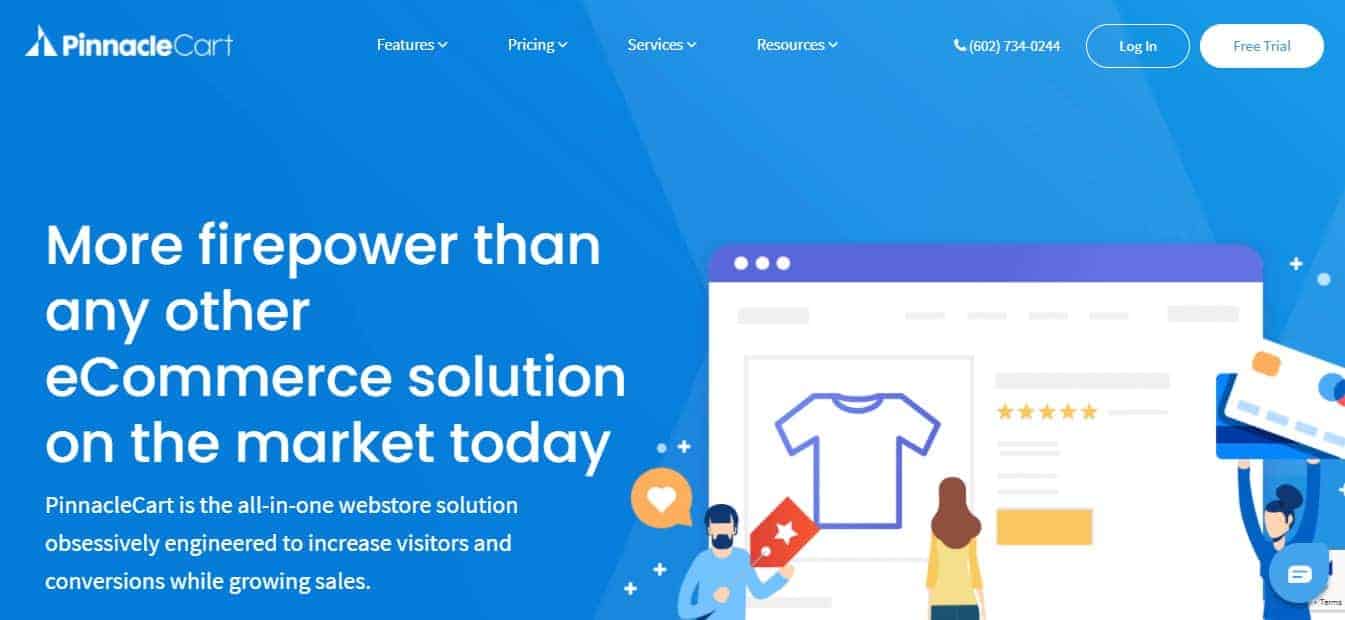
Services
Launched in the USA in 2004, PinnacleCart has stayed for nearly 2 decades. With up to 50,000+ customers and $50,000+ million in revenue per year, the platform is far ahead of garage and hotel room times.
For the features, PinnacleCart offers a wide selection of functional options, including advanced SEO. The platform offers to 50 different integrations with fulfillment and shopping, accounting and tax, customer engagement, marketing, and reporting and analytics apps.
Pricing
As with many e-commerce platforms, PinnacleCart offers a 14-day trial and doesn’t require any credit card information or the trial. You will have a choice of four plans which include a large enterprise plan. Each plan offers the sale of unlimited products, daily backups, customer support, and an SSL certificate.
You notice the plan design makes the platform scalable as your site continues to grow. The Startup plan costs $44.95 per month and offers 1 GB website storage with 2 GB bandwidth and a QuickBooks integration.
The Advanced plan costs $199.95 per month and offers unlimited website storage, unlimited bandwidth, QuickBooks integration, priority customer support, and a dedicated SSL certificate. For larger enterprise businesses that require better disk space, bandwidth, and hosting control. The platform offers a more tailored package based on their needs. PinnacleCart offers a licensed hosting copy or your own server for $1495.
Customer Support
Customer support is adequate but limited in time. You will have access to both phones, live chat, and email support. Phone support is available on weekdays and Sundays from 6 am to 1 am and 4 pm to 1 am, respectively. Live chat support is available from Monday to Thursday from 6 am to 1 am, Friday from 6 am to 9 pm, and Sunday from 4 pm to 1 am.
Email and web ticketing support are available all around however, expect a response within 24 to 48 hours. Alternatively, you can choose to pursue other resources such as the FAQs page, user forum, knowledge base, and blog – all on the website.
Payments and Shipping
The best part about using PinnacleCart as a merchant is that it doesn’t charge any transaction or cancellation fees. Pinnacle integrates with over 30 payment gateways including Braintree, American Express, 2 Checkout, eMerchant, etc. – but also has a particular arrangement with CardConnect.
Ease of Use and Design
The PinnacleCart user interface is easy to get around. Once you log in for the first time, it will greet you with a Quick Start Guide to make setup easy. The Setup Your Store page also makes set up a breeze with all the features clearly labeled. With a drag-and-drop editor, even the not-so-tech-savvies can easily use the platform.
Pros
- Reasonable customer support.
- Advanced SEO features.
- Easy to integrate with other software- free QuickBooks integration.
- User-friendly interface.
Cons
- Customization is not very easy.
PrestaShop
PrestaShop is a free open-source e-commerce platform designed to help you build and launch your website. They build the platform for beginners or small businesses looking to establish their online stores with no advanced technology.
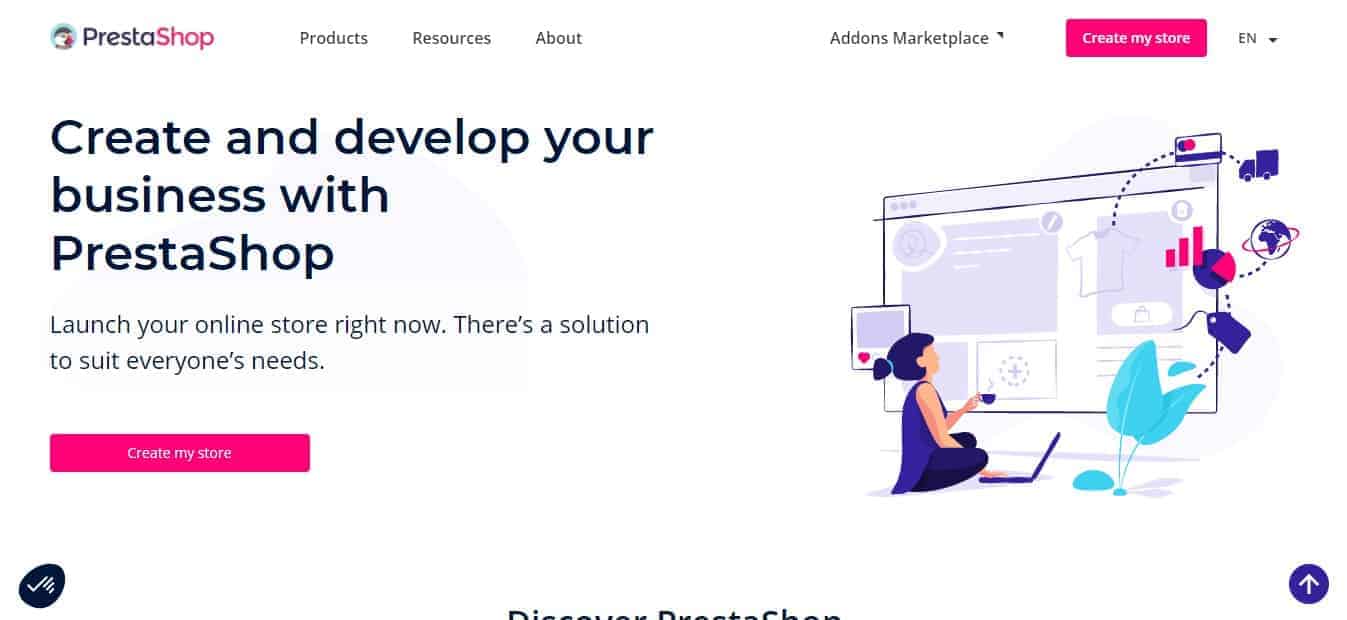
Services
Launched in France in 2007, the freemium platform was published under an open software license and written in PHP language with MySQL database management system support. So far, the platform supports up to 300,000 shops and is available in over 60 different languages, making it ideal for most parts of the world.
The platform employs over 200 staff and has an annual revenue of $20 million as of 2019. As mentioned above, the platform offers services in content management, website building, and marketing. Whilst it doesn’t offer hosting on its own, it is easy for you to sign up with one of its hosting partners.
In the platform, you will enjoy over 500 different e-commerce features and nearly 1000 modules and themes to choose from that’s quite a detail for an open-source platform created for beginners.
Pricing
PrestaShop doesn’t have a free trial period however, it is free to download and has a demo to give you a general idea of how the platform works. Whilst the platform is available for free, you will still need to pay for hosting and an SSL certificate. You can choose to go for the PrestaShop partners such as 1&1 or A2 hosting.
Typically, you will pay anywhere from $4 to $14 per month. Since it is a freemium open-source platform, if you want to change some features and customization, you will need some coding skills. Here, you may have to hire a developer to help. Similarly, if you want to enjoy extra add-ons and third-party integrations, dig into your pockets for extra cash as well.
Customer Support
PrestaShop offers online help and technical help. The online help offers a range of free information sources such as tutorials, guides, training courses, and FAQs page. Alternatively, you can opt for technical help phone support with Presta specialists. However, this is a paid option and is normally expensive, ranging between $249 and $1399.
Payments and Shipping
PrestaShop allows integrations with payment gateways, especially popular ones such as Visa, PayPal, and Mastercard. The integrations with these gateways are free. However, they’ll charge a transaction fee on all your sales. If your shop is international and draws in customers from around the world, they will charge you international fees.
Ease of Use and Design
If you are looking for something straightforward, the PrestaShop platform is very easy to navigate and set up. However, as a free open-source platform, you may find that other stores that use this platform may hold a similar design or layout to yours.
So, if you want to make the site a little more unique and add more customizations, this is where a bit of skill is needed. Alternatively, hire a web developer to help as there will be some coding to do.
Pros
- Free platform you only pay for hosting, SSL certificate, and add-on features.
- Simple installation.
- Easily integrates with secure payment gateways for free.
- A large pool of users for a better support system on forums and discussion boards.
Cons
- Customization is difficult, as it involves coding.
Volusion
Volusion is an all-in-one e-commerce platform designed for small businesses to big enterprises. The platform allows people to set up online stores, add products, sell them, and even market their services.
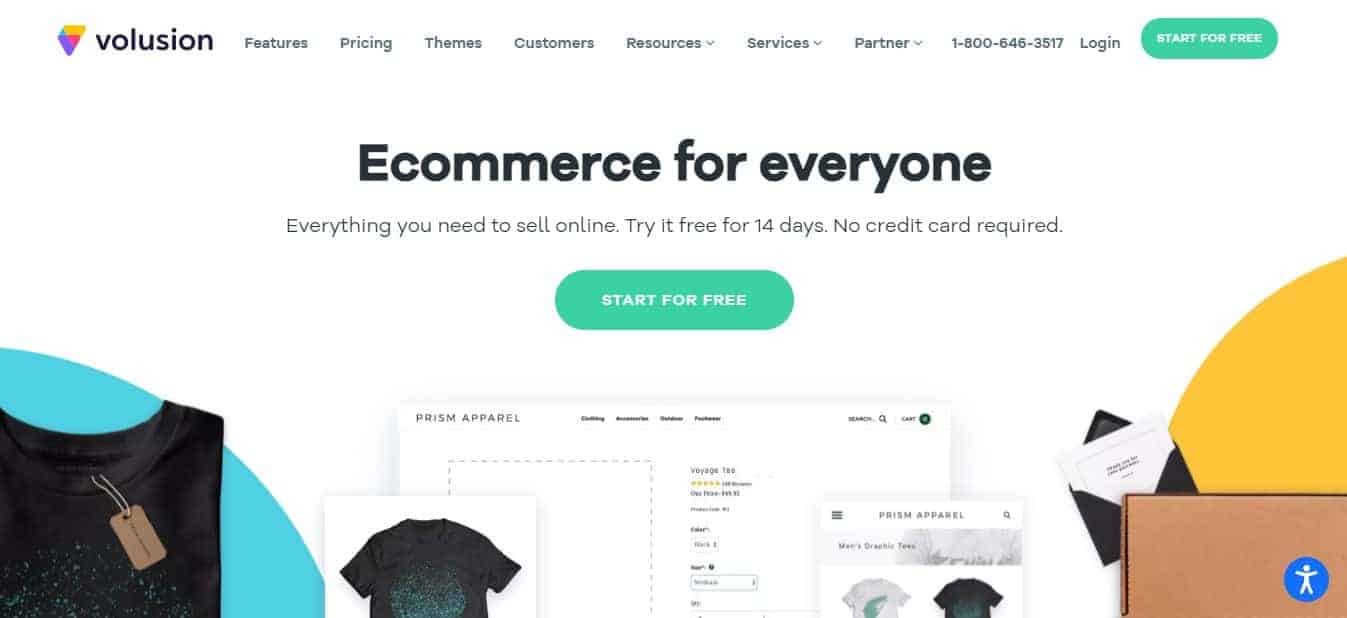
Services
Launched in 1999 in the USA, the platform is amongst the oldest e-commerce companies. Yet, this doesn’t mean that it no longer enjoys its fair share of clients. Employing over 200 staff, the platform hosts over 40,000 merchants, including 3M and Intel. As of 2019, the platform has processed over $24 billion in sales worldwide.
As stated, Volusion has been around for over 2 decades. Therefore, it doesn’t depend much on exterior features it is self-sufficient on its own. It only lists 21 integrations – which include Zapier. With Zapier, you can then connect with other integrations.
Pricing
Thus, if the sales increase, you automatically bumped up to the next plan.
With no surprise, each plan boasts even better-advanced features the higher you go. The plans are paid monthly by default with no cancellation or set-up fees. Alternatively, you can opt to pay annually and enjoy a 10% discount. The Personal plan is the cheapest at $29 per month and comes with $50k in annual sales.
The Professional plan costs $79 per month and runs up to $100k in annual sales. The Startup plan costs $179 per month and runs up to $250k in annual sales whilst the Business plan extends to $299 per month and extends to $500k per month in annual sales. The Prime plan on the other end caters to over $500k in annual sales. However, the cost depends on your needs.
Customer Support
Customer support is excellent and available to users 24/7. However, this also depends on your plan. Lower plans receive basic support whilst higher plans enjoy better support. You can opt for the phone, live chat, in-software help, help center, videos, training, blogs, and social media.
Payments and Shipping
Volusion integrates with limited but reliable payment gateways. These include PayPal Express Checkpoint, Stripe (which facilitates Apple Pay), and its own payment gateway known as Volusion Payments. The Volusion Payment’s powered by third-party payment and allows you to enjoy discounted transactional fees. However, Volusion Payments is only available in the US.
Ease of Use and Design
The basic features and overall setup are quite easy to navigate. In fact, the free trial option is a perfect avenue to experience the user interface for yourself. One can even say that Volusion is not that complicated, thanks to its limited features and clean arrangement.
Pros
- Easy to use interface.
- Reliable and effective customer support.
- Years of experience in the market.
- Zapier integration gives you access to other third-party integrations.
Cons
- Expensive even for the lowest plan.
Shopware AG
If you are looking for an e-commerce platform that offers superior SEO functions, Shopware AG is a perfect option.
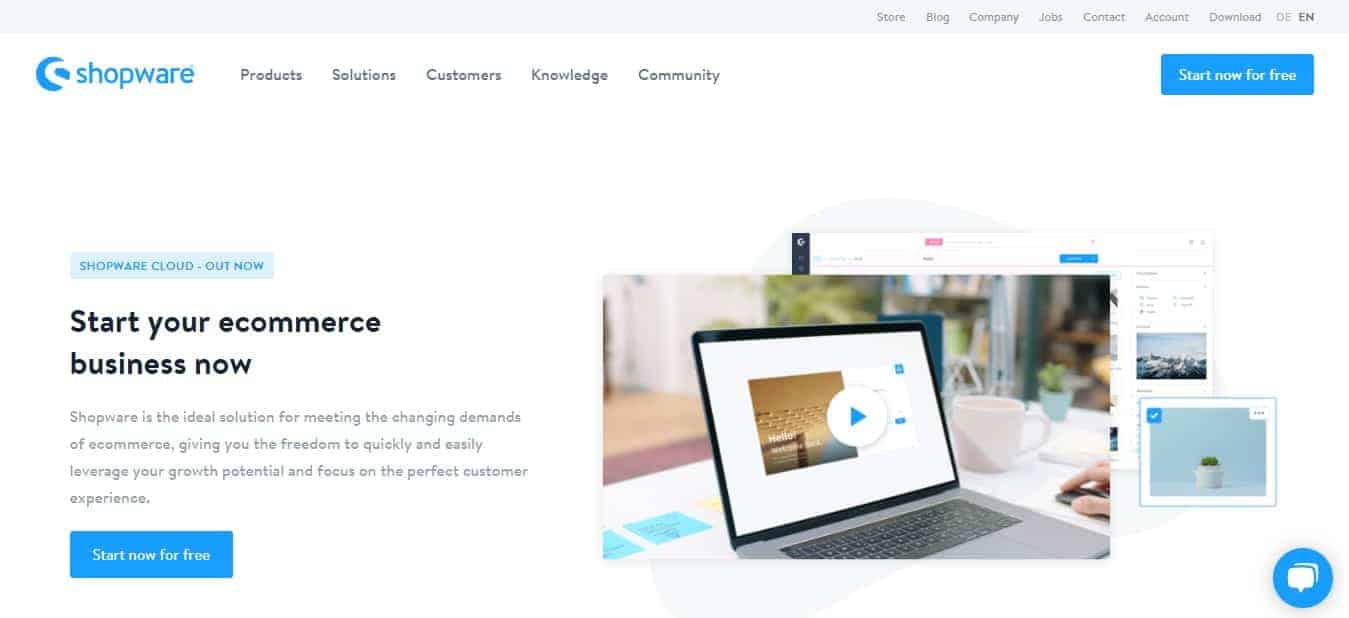
They design E-commerce. platform to cater to users of all kinds, whether you are a beginner with no technological background or an extensive business with a pool of web developers. The platform works great for those who want to scale up their platforms.
Services
Founded in Germany in 2000, the E-commerce. platform employs over 90 staff and services over 50,000 customers. In fact, over the years, the platform has drawn in prominent customers, including L’Oréal and Segway. In fact, the platform has been seeing increased customer migration from other platforms, most notably Magento, Oxid Eshop, PrestaShop, WooCommerce, and Xt: commerce.
It brings in a whopping $18 million in revenue per year.in addition to its advanced and innovative features, Shopware Ag offers integrations with multiple apps which include SendinBlue, PayPal, and Stripe. Microsoft Dynamics, and Skrill, to mention a few.
Pricing
Instead of a free trial, Shopware AG offers a free Community Edition plan. In the plan, you will enjoy community support, extendable plugins, product streams, customer streams, and even shopping world presets. Alternatively, you can opt for a paid plan to enjoy more features.
The Professional plan costs a one-time 1,295 euros and offers all Commercial Edition features besides manufacturer support, warranty, storytelling feature, and a Shopware ERP. The Professional Plus plan costs a one-time 5,995 euros and offers all the lower plan features besides other premium features. The Enterprise plan on the other end offers a custom pricing option depending on how you curate your needs.
Customer Support
Customer support for Shopware AG is paid monthly. However, this means that you will enjoy better service. By better service, we mean they will assign you a dedicated technical account manager or general inquiries and Shopware-related issues.
Alternatively, you can access the free resources, including a user forum. Unfortunately, the user forum is only available in Germany. Alternatively, you can sign up for live learning, webinars, or certifications academy.
Payments and Shipping
As stated above, the Shopware AG platform integrates with multiple apps including payment gateway solutions such as PayPal and card solutions. As expected, whilst the integration is free, they will charge you a transaction fee for every purchase from your website.
Ease of Use and Design
Shopware AG offers a simple interface that is easy to navigate. They also complement it with flexible configuration and easy work lows. Everything is clearly labeled on the interface with no use of coding or advanced systems. Yet, to fully use the free plan, you need to have some technical experience.
Pros
- Easy to use interface.
- Designed with generous integrations.
- Offers a free plan option for newbies.
- Built with impressive and innovative e-commerce technology and advanced SEO features.
Cons
- They limit paid customer support user forum support to Germany.
Infusionsoft
Infusionsoft is an all-solution sales and marketing platform designed for small business owners. The platform especially works great for a company whose staff have to wear multiple hats thanks to the impressive automation and synergized workflow for superior marketing. The platform enhances a business’s automation, marketing, and customer relationship management.
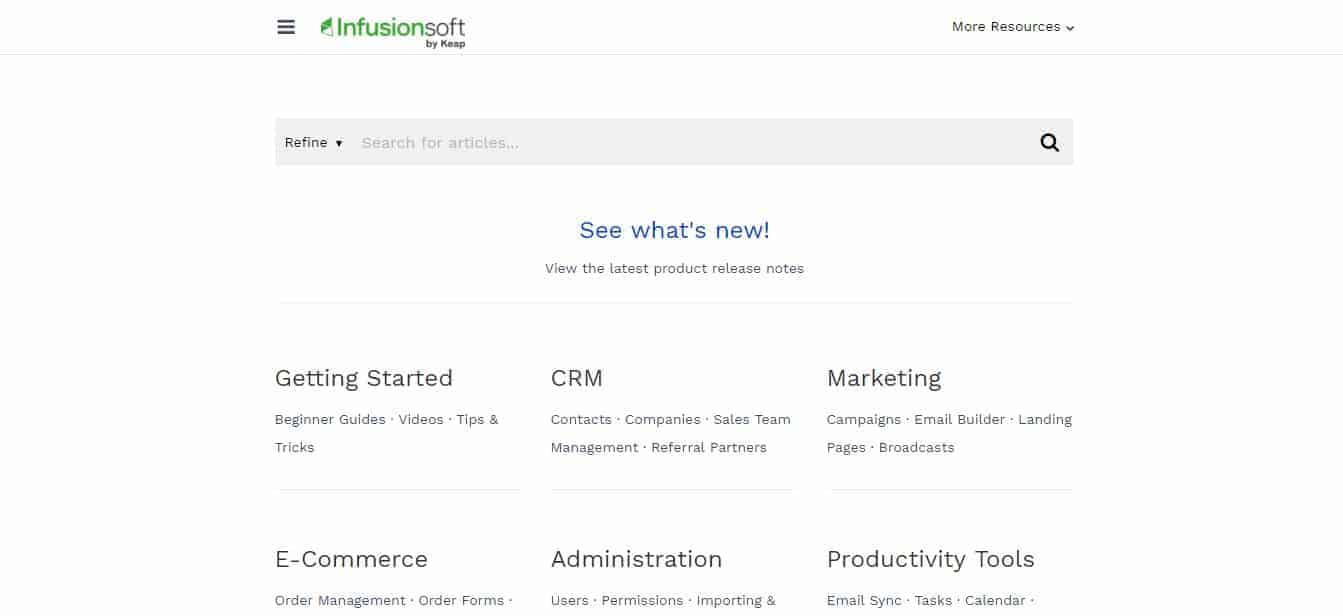
Services
Launched in the USA in 2001, the platform employs over 650 staff and services over 200K users. As of 2017, the platform has amassed over $100 million in annual revenue and sales. As an integrated email marketing platform for small businesses, the key services include CRM, marketing automation, lead scoring, and e-commerce. Besides the features offered, the platform offers incredible 3rd party integrations as well. These include Zapier, Memberium, and AccessAlly, to mention a few.
Pricing
With the pricing, the Infusionsoft platform doesn’t offer a free trial. However, you can sign up for a free demo to get a feel of how the platform works.
For an extra cost, you can add more contacts. For example, for an extra $30, they will bump the contact number to 1000 users., for $200 extra, you will receive 5000 more contacts, and for $350 extra, you will receive an extra 50,000 contacts. This bump in contacts allows for more users on your end too.
Customer Support
Kean Infusionsoft’s customer support offers an array of resources. These include help centers, user communities, and other online readings such as webinars. Besides these resources, you will also enjoy onboarding support to transition easily with resources and information on contact imports, email migrations, campaign migrations, rebuilds, and workflow transfers.
If you want extra support, you can opt for one-on-one coaching with in-house and external experts. However, this service paid costing a one-time charge of $99.
Payments and Shipping
The Kean Infusionsoft platform integrates with financial gateways too. It also supports multi-currency functions to make the process easier and more friendly to different locations in the world.
Ease of Use and Design
Infusionsoft platform comes with a slight learning curve however, once you get a hang of it, everything becomes a breeze. The email builder, it doesn’t offer as much of an easy-to-use or modern user interface as other standalone email marketing platforms.
Pros
- Offers a content management system, unlike other email marketing platforms.
- Supports precise email campaigns.
- Scalable is built to support small and growing businesses.
- Offers great segmentation and tracking.
Cons
- Has minimal customization for CRM.
X-Cart
X-Cart is a commercial shopping cart platform designed for online stores to sell products using their own server. They cater to any type of online store however; it works great for large stores and marketplaces.
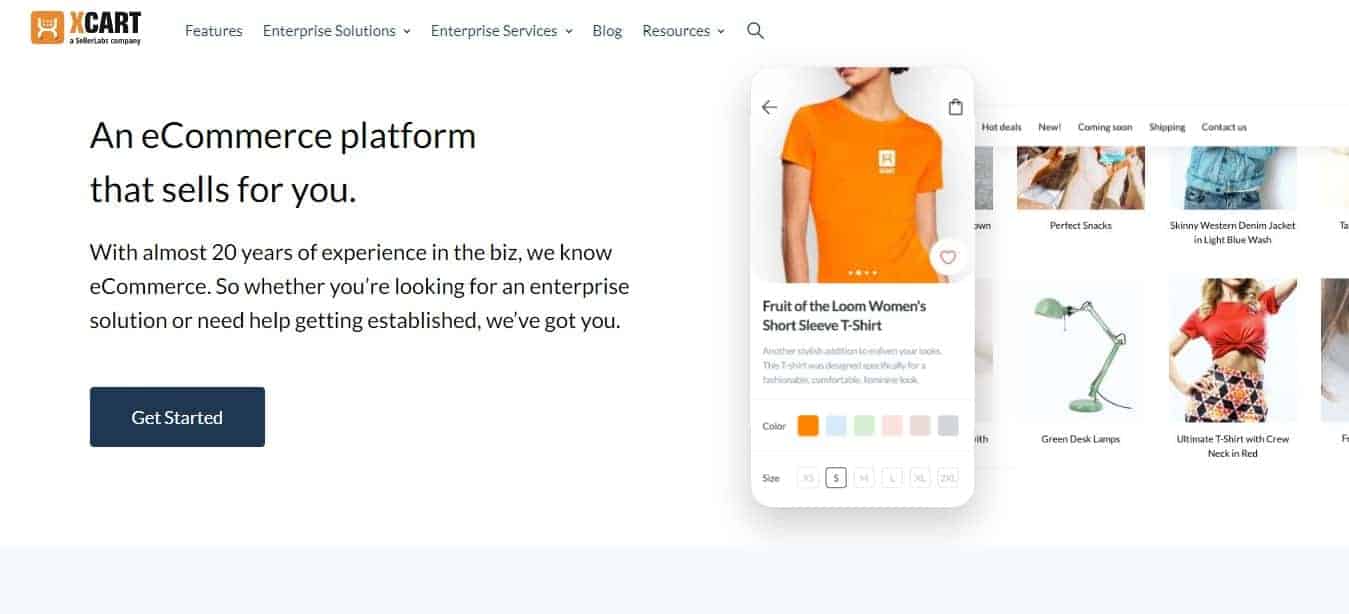
Services
Launched in the USA in 2001,
With over 100 employees, the platform amasses close to $3 billion annual gross merchandise volume. Besides its e-commerce feature, the platform comes with generous integrations.
These include shipping carriers such as USPS and FedEx, payment providers such as PayPal and Amazon Pay, tax automation systems such as Avalara, and marketing systems such as MailChimp. The platform offers two essential products, open-source software, and a hosted solution you can build an online store with. The open-source software allows you to buy a license and then build your site from scratch.
Pricing
Comes with a 30-day free trial with no credit card information needed, allowing you to test the platform before committing yourself. The open-source software plan is available for free, Simply download the open-source and build your online store by yourself. The plan will still give you access to the needed updates.
Whilst the open-source plan is free, you still have to pay for a hosting separate service. With the free edition, you will still enjoy unlimited products and orders, unlimited staff accounts, a drag-and-drop layout editor, an XML sitemap, 50+ themes, a bestseller feature, multiple languages, and even accept credit cards.
Alternatively, you can opt for paid plans such as the Business, Multivendor, and Ultimate plans, each costing $495, $1495, and $5995, respectively. Each of these plans comes with an additional feature such as multiple currencies, social media logins, and two-factor authentications at every stage.
The limitation of their Plans with no hosting is that you need to have some coding knowledge and be able to outsource your hosting service. Alternatively, you can opt for their Cloud plan with a hosting and scalable solution. These plans range from $49 per month (Cloud Essentials), $99 per month (Cloud Business), $199 per month (Cloud Premium), and the Enterprise plan at a tailored price.
Customer Support
Whilst X-Cart offers the open-source plan for free, pay for customer support. They base the support on three different levels. You can opt for the standard plan at $165 per month if paid annually and enjoy an 8-hour response time, unlimited support requests, and minor upgrades.
The premium plan costs $250 per month if paid annually offering all the standard plan offers with a reduced response time of 30 minutes, performance audit, annual SEO audit, phone/chat support, and image optimization/ Alternatively, you can opt for the custom plan whose pricing and features depends on how you tailor them.
Payments and Shipping
The X-Cart platform offers excellent payment processing. Besides its X-Payments Cloud connector, the platform comes with a variety of other free payment gateways, including options that can process international transactions. Amongst common solutions include PayPal, Skrill, Amazon Pay, eWAY, and BitPay, to mention a few.
Ease of Use and Design
The X-Cart platform is easy to use however, you will need to have some coding knowledge during setup. Alternatively, you can hire a developer to help. Typically, you need an understanding of concepts such as PHP, CSS, and JavaScript.
Pros
- Built-in SEO functions.
- Superior customization options.
- Offers a free open-source plan.
- Paid for but excellent customer support.
Cons
- You need some web developer knowledge.
Miva
Miva is an e-commerce shopping cart software designed for enterprise-level features. Whilst the platform work for all online stores, it’s optimized for enterprise-level business. Its simple design makes it great for all users, even those with no knowledge of tech.
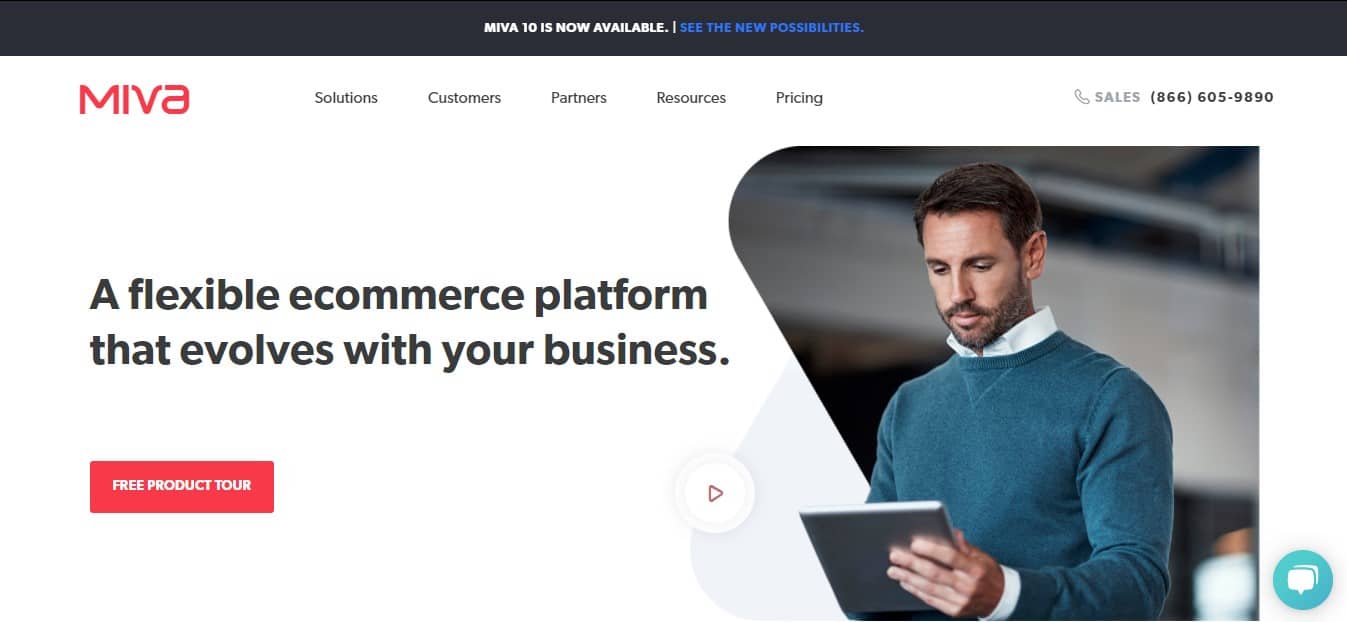
Services
Pricing
Miva delivers a free 30-day trial however, provide your credit card information and cancel your subscription before the 30-day cap, you will receive a full refund. Alternatively, you can register for a free demo developer account which allows you to get a feel of the platform without committing yourself.
They calculate the paid plans based on your business’s annual revenue. Typically, they lay pricing plans. These include a Starter plan that costs $79.95 per month and offers disk space of 2GB and bandwidth of 20GB with 2 admin seats. The Business plan costs $249.95 per month and offers disk space of 5GB and a bandwidth of 100GB with 3 admin seats.
The Professional plan costs $749.95 per month and offers disk space of 10GB and a bandwidth of 250GB- with 5 admin seats. Finally, the Enterprise plan costs around $1495 per month and offers disk space of 20 GB and bandwidth of 1000GB with up to 10 admin seats.
The plans boast an annual revenue limit of $99k, $499k, $999, and more than $1M, respectively. Each plan also comes with an SSL certificate and domain name however, expect to pay for them after a year. For any plan you choose, you can add an admin seat each seat will cost around $50 per month.
Customer Support
Customer support is quite good too. You will enjoy full support at any plan without the need or extra costs. Avenues of support include phone, email, web tickets, documentation, community forums, and video tutorials, to mention a few.
Payments and Shipping
Miva offers a tiny pool of payment procession solution integrations only 50 to be exact. That’s significantly small for the platform’s size. You will still be able to find popular platforms such as PayPal, Amazon Payments, and eMerchant.
Miva doesn’t charge transaction fees. However, this comes with a catch. Instead, you will be charged for bandwidth and storage overage. Typically, expect to pay around $2 per GB per month in additional bandwidth and around $15 per month for every extra GB of disk space.
Ease of Use and Design
The easiest way to try your skills with Miva is through the free developer plan or the free trial which you have to cancel before the 30-day hit. The platform also offers a step-by-step guide on how to set up your store via email. The admin interface is not as easy for a beginner -however, you find they mark the relevant features under the easy-to-identify icons, so, over time, get a hang of it.
Pros
- Specially designed for large enterprise businesses.
- A ton of customizable features.
- Excellent free customer support.
- Scalable hosts large businesses that are still growing.
Cons
- Plans are a little expensive, as are add-ons such as extra admin seats.
CS-Cart
CS-Cart is a fully licensed and self-hosted platform that delivers multi-vendor e-commerce and shopping cart services. They design the platform for many merchants, whether you have a small business or a larger enterprise business.
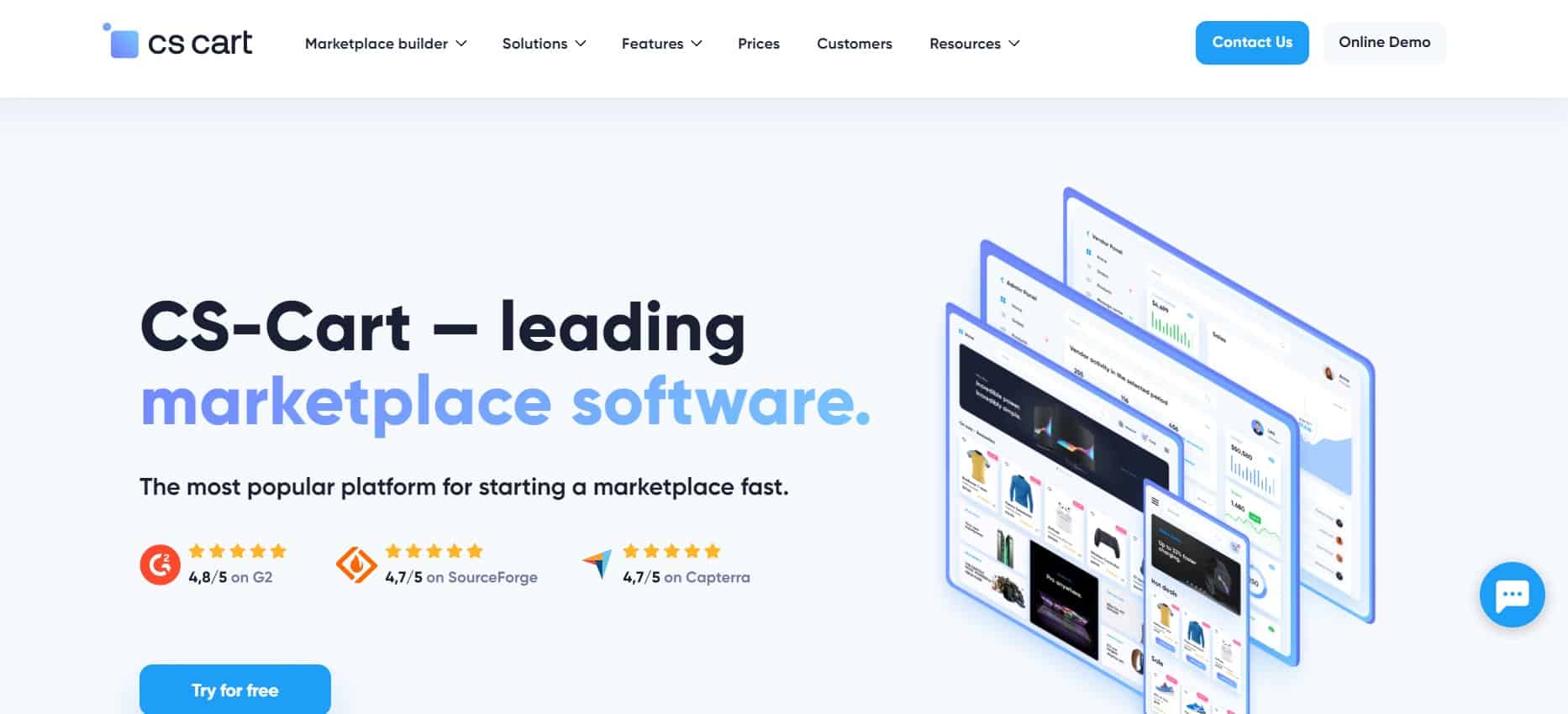
Services
Launched in Russia in 2005, the platform has been in business for more than a decade and has sold up to 35,000 copies of its software in over 150 countries. The platform offers two key services. A shopping cart software that allows you to build your own online store and a multi-vendor solution that allows you to build a marketplace such as eBay.
The best part about this platform is that you only purchase the software once and you don’t have to worry about subscription or renewal fees. However, pay for the annual upgrades and updates. For add-ons, CS-Cart has quite minimal options.
However, integrating them is easy. You can connect with other third-party apps but at an extra cost depending on the app. For example, a MailChimp connect costs $75.99 whilst a Facebook Store costs $130.
Pricing
The Shopping cart software costs $385 however, if you want to run unlimited stores with a single admin, you will pay $865. The marketplace option on the other end costs $1450. Besides the annual upgrades and updates, you will still have to pay for web hosting, SSL certificate, and web development help.
Whilst the platform doesn’t offer any free trial, it comes with a 30-day money-back guarantee to test if it works for you or not. Alternatively, you can try the demo which doesn’t prompt you to share information – allowing you to avoid sales calls If you decide against going for the platform.
Customer Support
When you first pay for the software, you will receive up to 50 support credits which you can use to contact customer service representatives. Once the support credits are depleted, you purchase extra points. You have a choice to purchase between 25 and 200 credits based on your needs and budget. The price ranges from $45 and $295, respectively.
Payments and Shipping
They facilitate payment processing with a chance of up to 50 payment solutions. Amongst the popular options, you will use include PayPal, eWAY, and 2Checkout. However, you will not be exempt from transaction charges with each payment option upon purchases on your site.
Ease of Use and Design
You can easily test the platform by using the demo to get an idea of how it works. After paying for the software, download and install it yourself. However, beyond setup, everything is simple to use.
Pros
- One-time software purchase.
- Built with rich features.
- The strong and intuitive visual editor.
- Easy for tech savvies to customize their site.
Cons
- Pay for customer support once it depletes points.
Beeketing
Beeketing is a marketing automation platform designed with 10+ built-in plugin apps that improve customer interaction, longevity, and sales for your online store. The crucial point of the Beeketing platform is to convert visitors to customers. The platform works by tracking visitors immediately after visiting your site and implementing workflows to turn the visitors into paying customers.
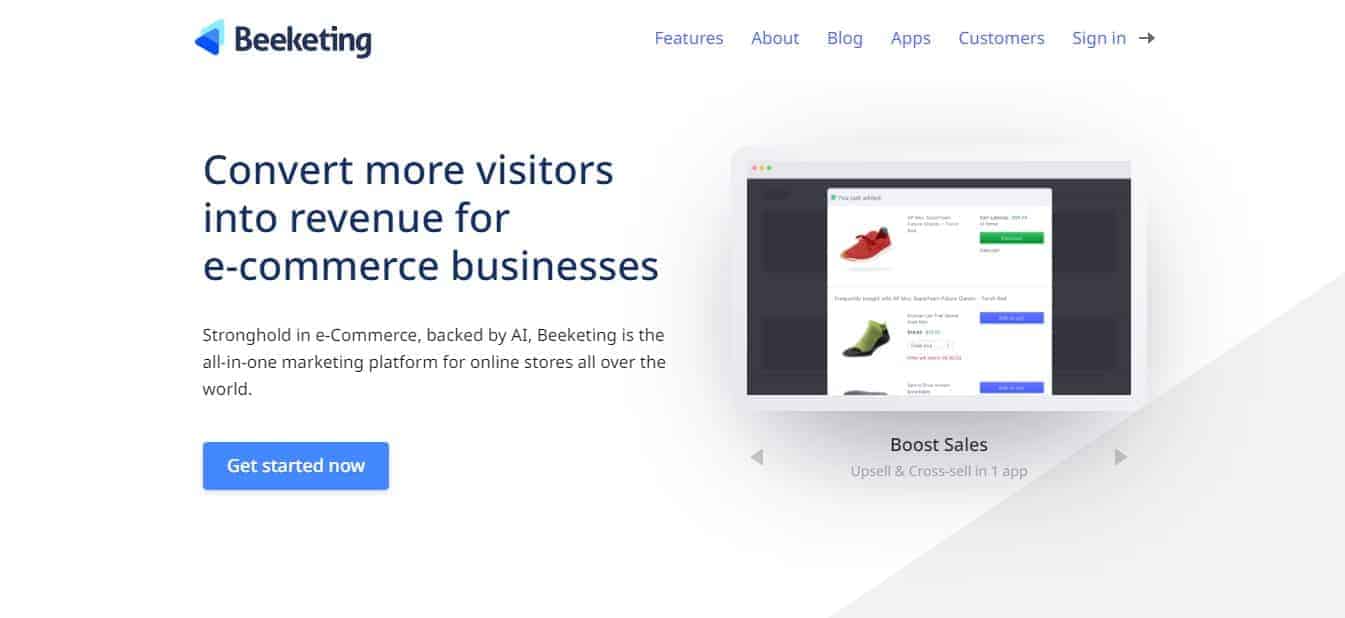
Services
Launched in 2008, the platform works great for startups, small businesses, and SMEs. So far, the platform has powered over 300k e-commerce businesses around the world. As mentioned above, Beeketing offers over 10 built-in app features such as Boost Sales, MilBot, Mobile Converter, and Checkout Boost to enhance functionality.
The platform analyzes visitor behavior similar to marketplaces such as Amazon and employs a series of processes such as email reminders, notifications, and pop-ups to improve interaction. Each of its built-in apps is included for a particular purpose.
For example, MailBot boosts conversion rates, increases loyalty, and increases retention rates, check out Boost boosts checkout rates, generates new leads from social media, and prevents cart abandonment, and so forth. The platform integrates seamlessly with other e-commerce platforms such as Shopify, Weebly, Magento, BigCommerce, WooCommerce, WordPress, and Lightspeed.
Pricing
The Beeketing platform offers a free trial, and a paid plan starting from $19 per month. The Beeketing platform is available based on the built-in features you want, which you install as plugins. Thus, it comes as no surprise that some will be free and it pays others for it. This design allows you to choose the apps based on your business needs.
Typically, free apps include Sales Pop, Better Coupon Box, Happy Email, Answers, Countdown Cart, Mobile Converter, Recover Cart Pusher, and Calbot Currency Converter. Paid apps include Boost Sales ($30 per month), Checkout Boost ($20-29 per month), MailBot ($29 per month), and Personalized Recommendation ($17 per month).
Customer Support
Beeketing offers a myriad of options for customer support. You can choose MailBot, email support, checkout boost, quick Facebook chat, mobile web boost, and ticketed support.
Ease of Use and Design
The Beeketing platform boasts a super easy-to-use interface. Once you choose the apps you want, you can easily install them and begin using them. In fact, the Beeketing platform is an award-winning app thanks to its ease-of-use interface.
However, whilst the Beeketing platform offers a series of apps to use with your e-commerce platform, it is worth keeping in mind that not all apps will work with all platforms. For example, the Recovered Cart Pusher, Countdown Cart, and Mobile Web Booster only work with Shopify, SalesPop Personalized Recommendations, and Better Coupon Box work for Shopify, WordPress, BigCommerce, Lightspeed, and Weebly, and so forth.
Pros
- Lightweight built-in apps.
- Easily integrates with several e-commerce platforms.
- Fully automated apps.
- Guaranteed to increase sales.
Cons
- Limited customer support.
3Dcart
3Dcart is a cloud-based e-commerce platform designed to service small and large businesses. Platform name based on the three key concepts it’s built upon store owners, search engines, and shoppers. The platform works on these three concepts to enhance its functionality and deliver results.
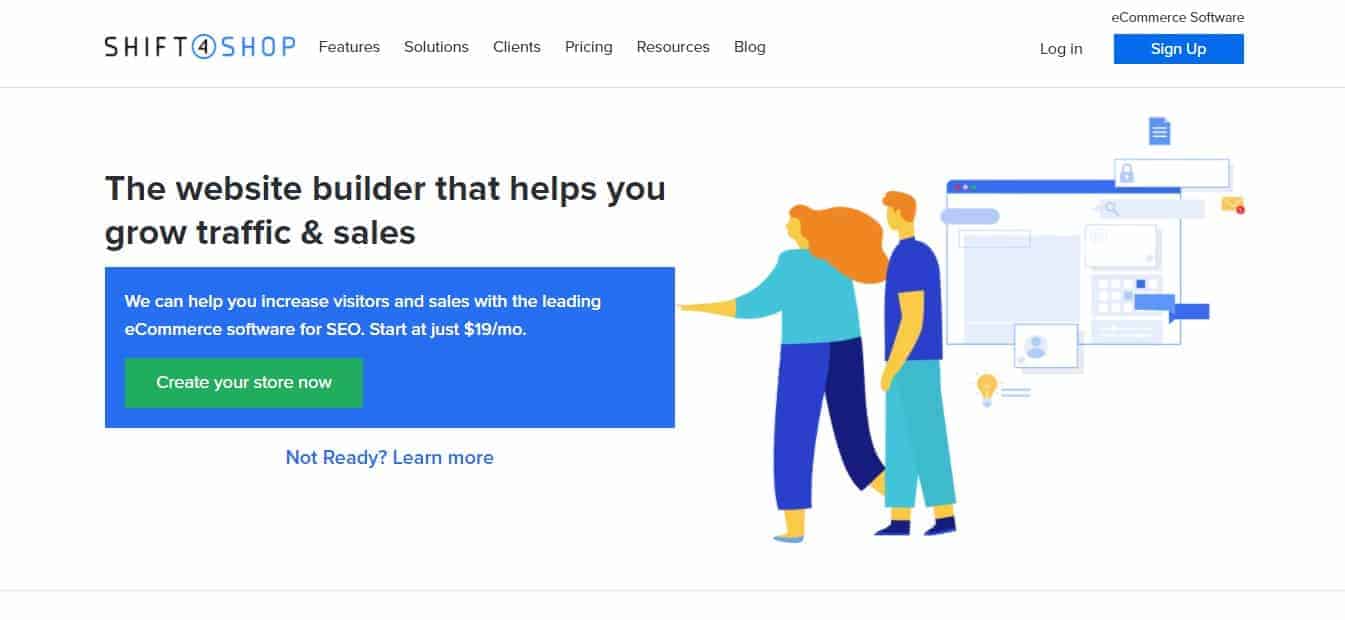
Services
Developed in 1992 in the USA, the platform has so far serviced over 25,000 customers with a revenue of over $16 million. As mentioned above, the platform works based on the three key concepts from which it draws its products.
From the site owners, it offers site design tools, inventory control, order management tools, robust marketing tools, informative site statistics, and automation. The Search Engine concept offers content management, page speed optimization, integration with dynamic sitemap, custom page URLs, and rich snippets.
For the Shopper concepts, the platform offers optimized navigation, streamlined checkout, customer relationship management, return merchandise authorization, a loyalty system with reward points, and wish lists and gift registries. One can say that the 3Dcart platform facilitates not only the launch of your site but facilitates successful running and revenue generation.
Pricing
The 3Dcart platform is available in a choice of five main subscription levels, i.e., Starter, Basic, Plus, Power, and Pro. You can find curated plans for Enterprise business. What sets these plans apart is of course the pricing and the features, annual business revenue, staff accounts, hosted email accounts, and customer support channels.
The Startup plan costs $19 per month and accommodates businesses of up to $50k annual revenue with one staff and two hosted email accounts. The Basic plan costs $29 per month and caters to businesses with revenues of up to 100k per year, 2 staff users, and 5 hosted email accounts. The Plus plan costs $79 and caters to businesses with up to 250k per year revenue, 5 staff users, and 10 hosted email accounts.
The Power Plan costs $129 per month and is designed for businesses with revenues of up to $500k per year, 10 staff users, and 1-0 hosted email accounts. The Pro plan costs $229 per month and is designed for businesses with revenues of up to $1M per year, 15 staff users, and 30 hosted email accounts. For enterprise-level businesses, one should expect a minimum of $499.99 per month and requires a $299 one-time setup fee.
This minimum plan caters to businesses that draw in a revenue of up to $5M per year and supports 20 staff users. The Enterprise II costs a minimum of $999.99 per month and caters to businesses with a revenue of up to $10M per year and 40 staff users. For an enterprise-level business with more than $10M in revenue per year, they will charge you based on your tailored needs.
Customer Support
Customer support is reliable. For Startup plan users, you will have access to email, web tickets, and live chat support. Higher plans offer phone support as well. You can also find website resources such as YouTube tutorials, support forums, manuals for modules, and a knowledge base.
Payments and Shipping
3Dcart doesn’t charge any transactional fees, however, based on the payment gateway solution you choose, they will charge you a processing fee. Popular providers include PayPal, Stripe, and Square.
Ease of Use and Design
The platform features a user-friendly interface. However, you notice that many of the 3Dcart functions use a two-setup process, meaning that you must first go through a series of menu options on one page to redirect to the next. Otherwise, the 3Dcart interface is pretty straightforward.
Pros
- Generously available and affordable plans.
- Reliable customer support.
- Adequate features.
- Over 200 available integrations.
Cons
- There’s a bit of a learning curve.
Site123
Site123 is a platform that works as an editor built to optimize your website design. With this platform, you don’t need to have any special skills in design or coding. What makes the platform special is that they design it to cater to a wide range of businesses.

Services
Launched in 2015 in Israel, the platform has seen significant growth catering to over 30,000 users. The platform works as its name suggests in three steps: design, content, and going live. The designs offered are available in businesses, online stores, and portfolio types. They then break the designs down into specific niches whether it’s a hair salon, apparel store, or a gardening site. The platform like other website builders features a blog.
Pricing
The site123 platform comes in a choice of five different pricing options. The platform offers a free plan which allows you to create a small site and try out the editor. A Basic plan costs 10 euros and can handle up to 10 orders per month with offline payment methods. The Advanced plan costs 15.58 euros this plan eliminates ads, allows translation in over one language, and includes PayPal as an e-commerce option.
The Professional plan costs 21.14 euros and accommodates credit card e-commerce solutions and up to three different languages. The Gold plan costs 26.70 euros with all features from lower plans, along with unlimited orders and up to 5 languages. Besides the features, they’re packed with, paid plans come with a free domain name valid for a year after then, pay for it.
Customer Support
The site123 platform offers reliable customer support. Amongst the options include live chat and email support. You can also find a variety of resources online which include FAQs. However, the limitation of Site123’s customer support is that it doesn’t offer a phone support option.
Payments and Shipping
You will only enjoy the e-commerce payment option from paid plans. The Advanced plan comes with a PayPal integration whilst the Professional plan allows both PayPal and credit card payment gateways. These plans allow you to set up an online store and use payment plans such as PayPal, credit card gateways, and offline payments. Besides these available payment gateways, the higher the plan is, the more you can sell.
Ease of Use and Design
It does not complicate the user interface.
Pros
- Comes with a free plan.
- Offers multilingual options at higher plans.
- Compatible with PCs, laptops, tablets, and smartphones.
- Reliable live chat support.
Cons
- Templates on live sites are unchangeable.
Sharetribe
Sharetribe is an innovative platform designed for small businesses and entrepreneurs to create their own peer-to-peer marketplace so they can rent out, sell, offer services, and even give products/services away for free. It works for a wide range of niches without the user requiring any advanced skills to code, or download.
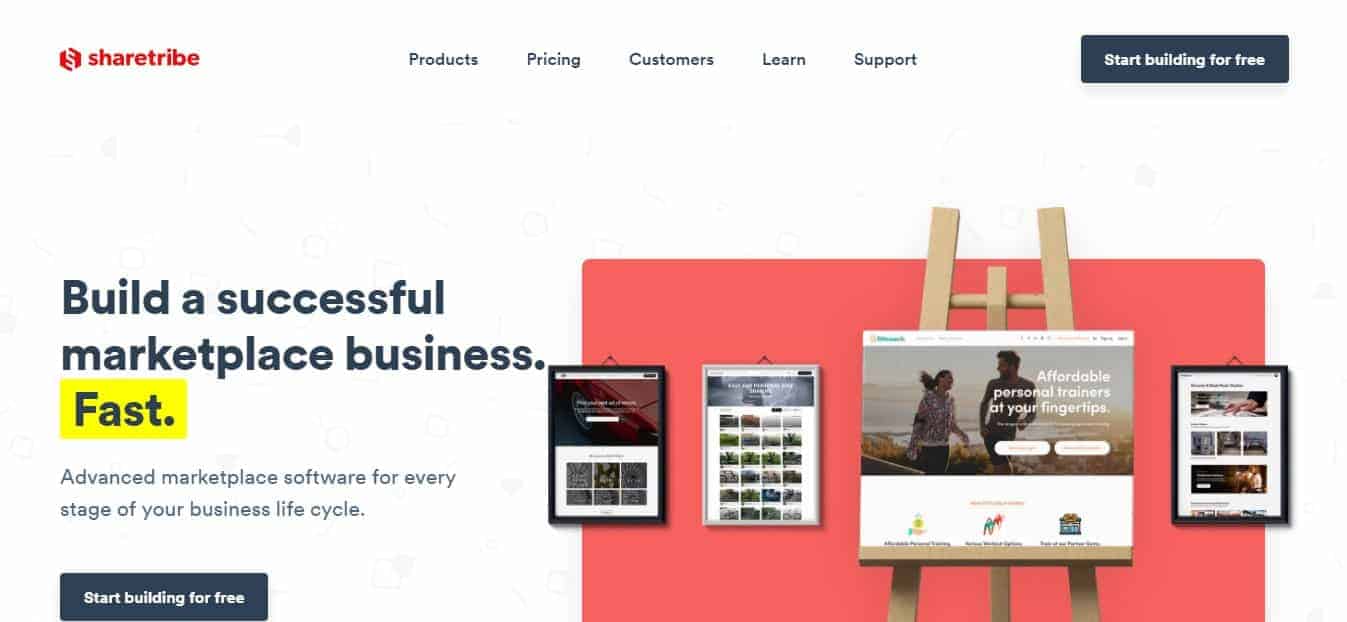
Services
Launched in 2014 in Finland, the platform is still relatively small with only 11 employees but has so far seen revenue of up to $2M from over 10,000 users. The platform doesn’t involve any complicated tech workflows; Worry about it. Instead, it focuses on providing smooth transactional processes, hosting, and online payments.
Some common features you will enjoy include email marketing, multi-store management, and SEO optimization. Custom brandings, order management, customer accounts, and built-in payment. The Sharetribe platform offers 5 different languages which include English, German, Spanish, French, and Portuguese.
Pricing
Sharetribe is available in a choice of 5 different pricing plans. These include a free trial, Hobby, Pro, Growth, and Scale plans. As clear from the title, the free plan is available for free and caters to a low number of users. The Hobby plan costs 499 per month and $79 per month if you pay up to 6 months. This plan allows up to 100 users. The Pro plan on the other end costs $149 per month or $119 per month if paid for up to 6 months.
This plan allows up to 1000 users, your own domain, a customizable footer, removes the Sharetribe branding, unlimited transactions, unlimited listing, and using outgoing email addresses. The Growth plan costs $199 per month or $1559 per month if paid for 6 months, It includes all features that the Pro plan offers along with allowing up to 10,000 users. The Scale plan costs $299 per month or $239 per month if paid for every 6 months. Besides the features of the Growth plan, the plan allows up to 100k users as well.
Customer Support
Sharetribe may not offer an adequate customer support route. However, it still offers powerful tech support through a powerful community of contributors, users, and developers. It guarantees you find almost anything you need in terms of navigation or setting up your account.
Payments and Shipping
With the payment system, the Sharetribe platform does a fantastic job. Built with an advanced system, it allows up to 25+ different currencies and works seamlessly in over 190 countries.
Ease of Use and Design
Pros
- Built with basic email marketing tools including segmentation features.
- It doesn’t require any specialized skills to use it.
- Offers useful CMS.
- Offers adequate customer support.
Cons
- Offers limited customization.
NopCommerce
However, you can also opt for a more premium and advanced option at a paid subscription.
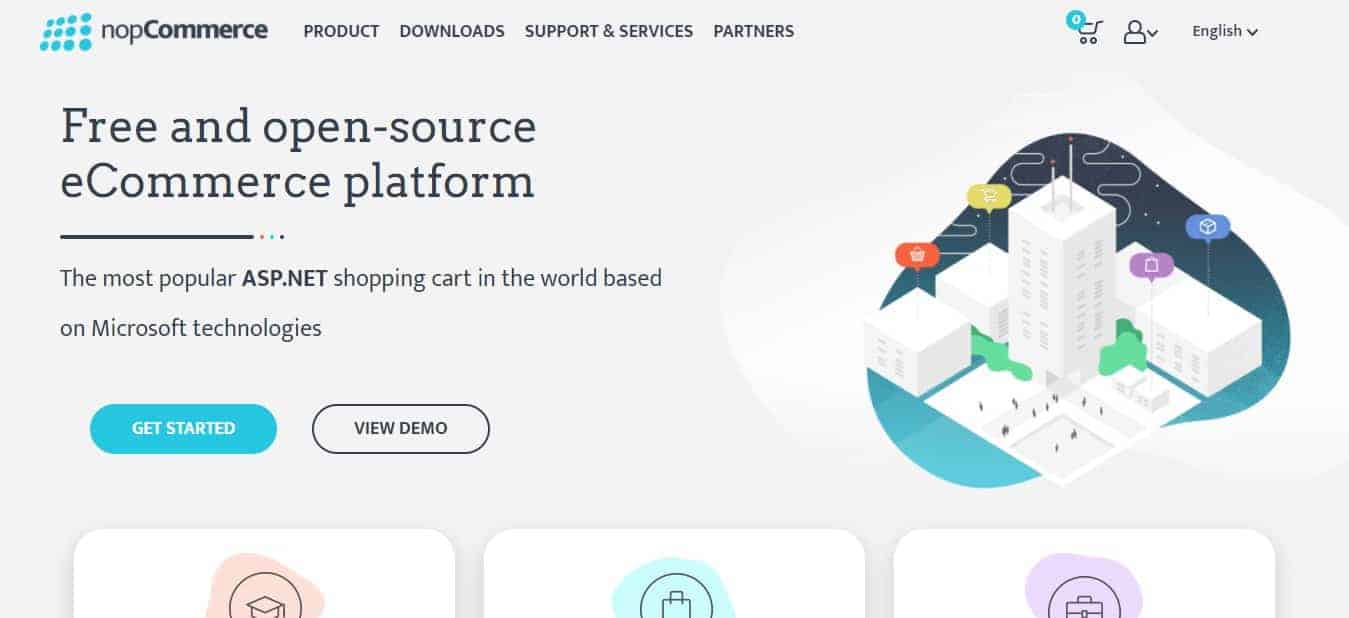
Services
Launched in 2008 in Russia, the NopCommerce platform Microsoft has recognized so far and even included in its web platform installer. As of 2019, the program has been used by over 36000 websites and downloaded over 3 million times.
In fact, the platform is even used by popular brands such as Puma, Columbia, Speedo, and Volvo. To enhance the user pool, the program has been translated into over 30 languages. Whilst the program is available for download and installation to everyone, it may not be as easy as it sounds.
To fully use the program, you need some skills and a solid understanding of .NET, MS SQL, HTML, and CSS to understand Microsoft-based systems. In terms of features, the platform offers a wide range of tools including different store availability routes, products such as inventory management, return management, products comparison, and pricing customization, customer services such as wish list, live chat integration, and multilingual/multi-currency support, marketing tools such as logs, newsletter, and gift cards, SEO tools, and shipping and tax calculators.
In terms of themes, you will have up to 40 different options and purchase more with pricing ranging from $40 to $250. Integration-wise, the platform connects with over 1000 third-party apps and software. Whilst others are for free, some cost between $20 and $250.
Pricing
As mentioned above, the NopCommerce platform is open-source, thus, it is available for free to download and install. However, this doesn’t mean that you will spend nothing. There are still costs associated with web hosting, web design, feature add-ons, and an SSL certificate. To optimize the platform, you may need to further invest in extra Microsoft products.
Customer Support
NopCommerce doesn’t really offer personal or one-on-one support. Unless you opt for the premium plan which is quite expensive. Instead, you can find many resources such as community forums, documentation, blogs, webinars, and events.
Payments and Shipping
NopCommerce supports over 50 different payment methods. However, they don’t have any special setup, so you will incur processing and transactional fees. The payment methods available include cash on delivery, pay in-store, PO, check or money order, offline payment, PayPal, Amazon Pay, and Braintree, just to mention a few.
Ease of Use and Design
As mentioned before, you will need some skills to use the NopCommerce platform. Alternatively, you can always hire a web developer to help. If you have the time and interest, the platform also offers a free demo which gives you access to a sample admin and separate storefront to familiarize yourself with the platform.
Pros
- Offers a significant number of integrations.
- Great community support.
- A myriad of customization options.
- Releases upgraded software from time to time.
Cons
- No one-on-one support for the open-source platform.
Sumo
Sumo is a plugin designed to deliver a wide range of tools and features to grow your email list. The marketing tool works for both WordPress and non-WordPress-powered websites. What makes this tool special is that it comes with a plethora of features and apps that combine to grow your emailing list and ultimately generate revenue for your website.
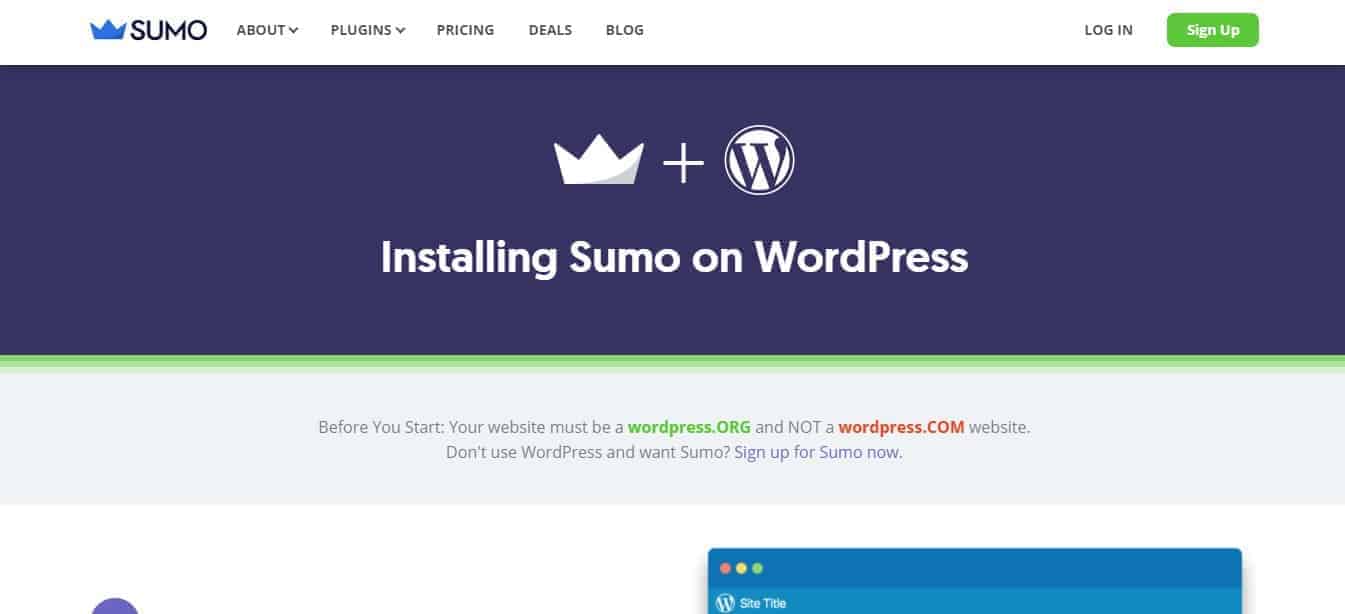
Services
A relatively young platform, Sumo was just launched in 2015 by serial online Entrepreneur Noah Kagan. The platform has supported over 1K startups. They design the tool for business owners who want to increase traffic to their site, enhance their customer pool, and measure their performance.
The platform is so far packed with 13 key apps which include list building such as List Builder and Smart Bar, on-site analytics such as Google Analytics and Content Analytics, social sharing such as Share, Image Sharer, and Highlighter, traffic such as Discover, communication such as Contact Form, and e-commerce features such as Buy Button.
Pricing
The only limitation is that it lacks VIP customer support and forces its branding on your website and campaigns. The free open-source plan works perfectly for small businesses and startups it accommodates up to 500 subscribers.
For professional bloggers and consultants, a Professional/Sui Pro plan allows for an upgrade to a premium plan costing $48 per month. Alternatively, you can opt for the three additional plans, the small business plan which costs $79 per month curated from small teams, the E-commerce plan at $199 per month curated for e-commerce and SaaS companies, and the Team plan which works for bigger businesses and content networks.
This plan offers different prices based on your choice of tailoring. Whilst the pricing is for a month-to-month period, if you opt to pay for an annual subscription, you will enjoy up to a 40% discount. So, for example, instead of $48 per month, you will only pay $29 per month for the Professional/SumoPro plan.
Customer Support
The Sumo customer support is not personal. Instead, you have the option of an interactive and information-rich community forum. For the paid plans, however, it is different. You will access live chat and email support services as well.
Ease of Use and Design
The Sumo tool is extremely easy to use for anyone. It doesn’t come with any need for coding, so even the non-tech savvy can enjoy the tools it offers. As a free open-source tool, there isn’t much of a process to access the tool simply download, install, and use it.
Pros
- Easy-to-navigate user interface.
- Up to 13 different useful apps and tools.
- Works with major email services to reduce the risks of spam.
- Available in a free open-source version.
Cons
- Branding in the free plan can easily put off potential customers.
FAQ’S
Which platform is best for creating an e-commerce store?
Our recommendation for the best e-commerce platform is Shopify. This platform comes with a myriad of benefits. Not only is the choice of pricing plans reasonable, but they also pack it with a series of integrations, functional built-in features, and quite a secure and easy to navigate interface.
What Is The Best E-commerce Platform For Startups?
Our recommendation for the best e-commerce platform for startups is Magento. The platform offers a free open source plan allowing startup owners to save cash on the monthly plans instead, they will only pay for web hosting and a little of web design. The tool accommodates businesses looking to scale up charging you based on the revenue you bring in should you opt for a paid plan.
What Are The Different E-commerce Platforms?
There are several e-commerce platforms as listed above these include Shopify, Magento, BigCommerce, Volusion, and 3DCart, just to mention a few.
What Is The Cheapest E-commerce Platform?
You can find a wide selection of the cheapest e-commerce platforms. Amongst them include Shopify, Magento, and SquareSpace.
What Is The Easiest E-commerce Platform?
With easy setup and a user-friendly interface, Shopify doesn’t do an excellent job. The platform is not only beginner-friendly but also works great for the non-tech savvy. You will not have to worry about any coding or complicated workflows at any stage, whether it’s during set up or navigation.
Is It Better To Sell On Amazon Or Shopify?
Shopify is a better option, especially for business owners. Amazon works more for individual or small scale sellers who otherwise have limited resources. Shopify allows you to take ownership of your processes and customize your website and workflows based on how you want. Shopify offers quite a cost-friendly option in fact, it is cheaper compared to Amazon’s Professional plan.
Is There Anything Better Than Shopify?
Not really. You can still find reliable e-commerce platforms that live up to they refer the standard of Shopify and to as worthy competitors. Amongst them are BigCommerce, Magento, 3DCart, and Volusion based on the needs of your business.
Is Shopify Free To Use?
Not really. Shopify is available in four common paid plans. However, it also comes with a free 14-day trial period with no risks or attachments it allows you to decide whether the platform works for you.
What Is The Biggest E-commerce Platform?
With over $1million businesses registered from 175 countries and a revenue of over $1 billion, Shopify is currently the world’s biggest e-commerce platform. The platform has still shown more potential to continue growing for the next few years.
What E-commerce Platform Does Nike Use?
Amongst the top brands in the world, Nike uses Magneto. It favors the platform for its sleek and modern powered web store features, which makes it stand out.
What Is The Largest E-Commerce Platform In The World?
At the moment, Amazon is the largest and most popular platform in the world. The e-commerce platform draws $280 billion in revenue per year and services over 300 million active customers worldwide.
What Is The Number 1 E-commerce Site?
Currently, Amazon is placed at the position for the number 1 e-commerce site.
Is Shopify Still Profitable 2020?
Yes, Shopify is still profitable even in 2020. In fact, the platform has continued to see a steady rise in both customers and revenues over the years. According to Business Wire, Shopify has seen a steady rise in its revenue in the first quarter of 2020 from that of 2019 by up to 43% – to over $250M.
Is Wix Better Than Shopify?
It all depends on the needs of your business and website. Wix is generally designed for smaller online stores with only 100 products. Shopify on the other end can handle both small and larger stores. So, if you have a business you want to scale up, Shopify is most definitely a perfect choice.
Who Are The Top 10 Online Retailers?
The top 10 online retailers include Amazon, Walmart, Apple, Home Depot, Costco, jd.com, Dell technologies, Walgreens, The Kroger Co., and Target.

